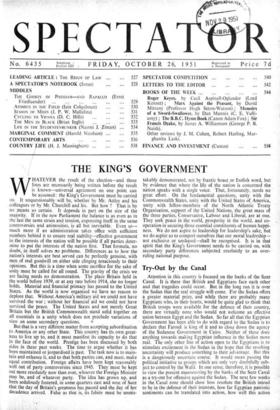THE KING'S GOVERNMENT
WHATEVER the result of the election—and these lines are necessarily being written before the result is known—universal agreement on -one point can be assumed: the King's Government must be carried on. It unquestionably will be, whether by Mr. Attlee and his colleagues or by Mr. Churchill and his. But how ? That is by no paeans so certain. It depends in part on the size of the majority. If in the new Parliament the balance is as even as in the last the same strain and tension, expressing itself in the same controversies and animosities, is all but inevitable. Even so— much more if an administration takes office with sufficient numbers behind it to ensure real stability—effective government in the interests of the nation will be possible if all parties deter- mine to put the interests of the nation first. That formula, no doubt, in itself solves no problems. Differences as to how the nation's interests are best served can be perfectly genuine, with men of real goodwill on either side clinging tenaciously to their opinions. But this is a time when some sacrifice for the sake of unity must be called for all round. The gravity of the crisis we are facing needs no demonstration. The place Britain held in the world before 1939. or at any rate before 1914, she no longer holds. Material and financial primacy has passed to. the United States. As the world is now organised we have no reason to deplore that. Without America's military aid we could not have survived the war ; without her financial aid we could not have survived the peace. The United States and not merely Great Britain but the British Commonwealth stand solid together on all essentials in a unity which does not preclude variations of view on some secondary questions. .40 But that is a very different matter from accepting subordination to America or any other State. This country has its own great- ness to live up to, and it must manifest its capacity to do that in the face of the world. Prestige has been discussed by both sides in these past weeks. The time to argue whether it has been maintained or jeopardised is past. The task now is to main- tain and enhance it, and to that both parties can, and must, make equal contribution. Foreign affairs have been kept reasonably well out of party, controversies since 1945. They must be kept out more resolutely now than ever, whoever the Foreign Minister may be, and of whatever party. The idea has grown up. and been sedulously fostered, in some quarters east and west of Suez that the day of Britain's greatness has passed and the day of her decadence arrived. False as that is, its falsity must be unmis- takably demonstrated, not by frantic boast or foolish word, but by evidence that where the life of the nation is concerned the nation speaks with a single voice. That, fortunately, needs no great effort. On the fundamental questions, unity with the Commonwealth States, unity with the United States of America, unity with fellow-members of the North Atlantic Treaty Organisation, support of the United Nations, the great mass of the three parties, Conservative, Labour and Liberal, are at one. They seek peace in the world, prosperity in the world, and co- operation in securing those essential constituents of human happi- ness. We do not aspire to leadership for leadership's sake, but we do aspire so to comport ourselves that our moral leadership— not exclusive or unshared—shall be recognised. It is in that spirit that the King's Government needs to be carried on, with secondary party differences subjected resolutely to an over- ruling national purpose.


































